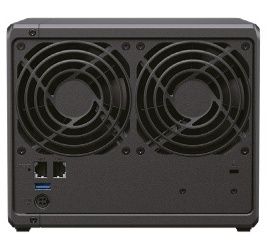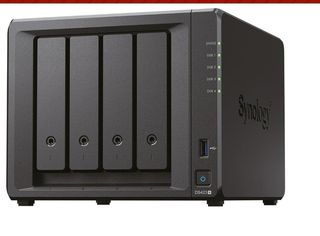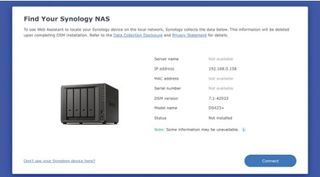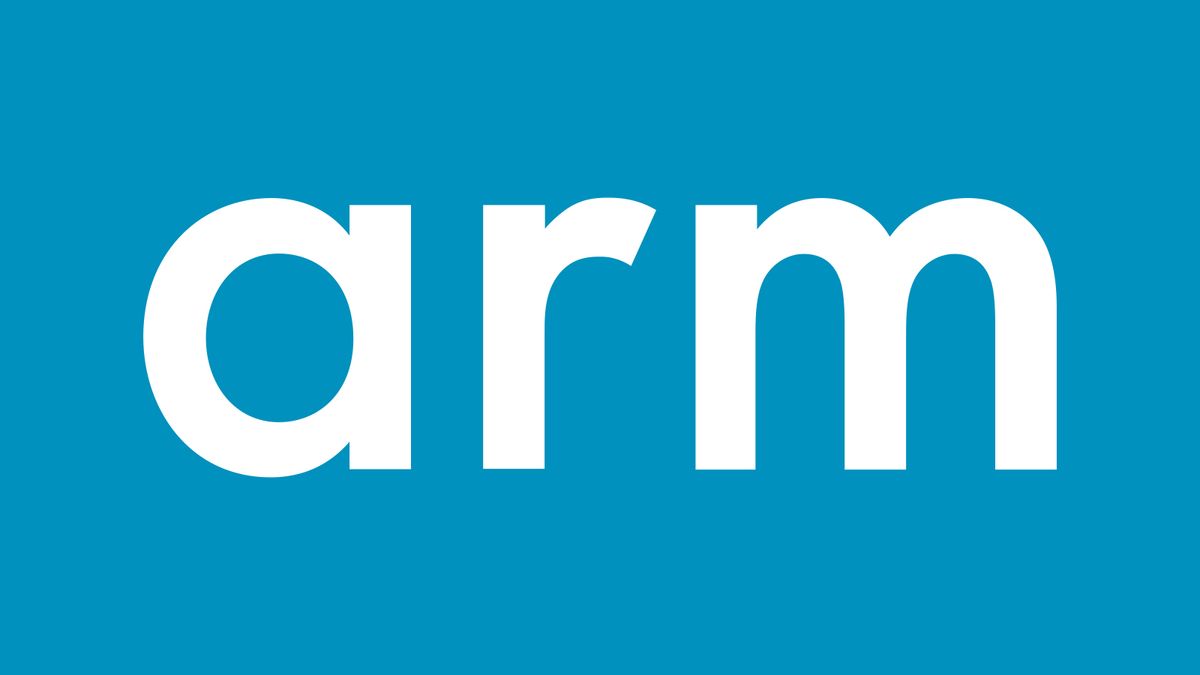This review first appeared in issue 358 of PC Pro.
Synology’s DiskStation DS423+ is a home and small office NAS, offering four SATA drive bays, and supporting up to a whopping 72TB of storage. With a Celeron J4125 processor and 2GB of RAM, it’s similarly specified to the two-bay DS224+. Unfortunately, that extends to its dual gigabit Ethernet ports, which look like a misstep when many competitors now offer 2.5GbE. Synology hasn’t been overly generous when it comes to other ports, either. You won’t find HDMI here, and there are only two USB-A 3.2 ports – and they’re the slower, 5Gbits/sec Gen 1.
The DS423+ does have a trick up its sleeve in the shape of two NVMe SSD slots. Drives in these can be configured as a cache for hard disk volumes, used to create a flash storage pool, or split between the two roles. A single SSD doesn’t offer data redundancy, though, so you’ll need to use both slots for caching if you want to accelerate disk writes as well as reads.

This is one of the easiest NAS devices we’ve tested when it comes to setup. Its lockable caddies are tool-less for 3.5in disks. It’s also quicker and easier than the norm to access its NVMe slots – you simply flip the enclosure on its back, pop open two small covers and click the drives in. Even the memory expansion slot can be accessed without tools.
We initially configured this NAS with four 1TB disks configured in a RAID5 array. While Synology, like other manufacturers, is usually quite relaxed about the brand of hard disk you fit, this doesn’t extend to NVM drives. The DS423+ was happy to use two unapproved 1TB WD Black drives as a disk cache, but you can use only approved SSDs to create a storage pool. At the time of our review there were just four approved SSDs on the compatibility list: they’re all made by Synology and have either 400GB or 800GB capacities, limiting you to an 800GB maximum for a flash volume with data redundancy.
With or without disk caching, this isn’t a particularly fast NAS. It lined up closely with other gigabit Ethernet devices in ATTO Disk Benchmark, hitting peak transfer rates of 110MB/sec (write) and 113MB/sec (read). It scored a fair 348 in the PCMark 10 Data Drive benchmark, and managed 59MB/sec writes and 46MB/sec reads in our 11GB Windows file copy test. We retested it when configured with two large WD disks, but its performance was essentially unchanged.
It’s fair to point out that disk caches become more effective over time, and our benchmarks don’t particularly show the benefits. It’s also worth noting that port bonding – in which the NAS balances the load across both Ethernet ports – would help the DS423+ deliver a greater throughput in a multi-user setup. Even so, no single user would see data transfer rates above the 113MB/sec gigabit Ethernet limit, which puts this NAS at a disadvantage when compared with 2.5GbE rivals such as QNAP’s TS-464.

That’s a shame, because it’s simple to manage Synology NAS boxes. DSM manages to combine user friendliness with plenty of functionality, spanning networking, security and convenience features such as QuickConnect, which lets you access the NAS remotely. You can bolt on extras through the Package Center, which at the time of writing offered 107 apps.
Highlights include strong third-party apps such as Plex Media Center, WordPress and various developer tools, but also Synology’s own software, which tends to focus on business requirements. Examples include Surveillance Station, Synology Mail Server and even the Synology Office suite. There are also tools such as Synology High Availability, which lets you use a second NAS to provide failover cover should the active server fail.

In most ways, the DS423+ is a great product for small businesses, and if speed isn’t a major concern then it’s a good choice. However, with only 1GbE network interfaces – and no expansion slot to upgrade them – it could become a bottleneck in a growing business, particularly one that needs to back up or work with large volumes of data. If that’s likely to be you, we’d advise stretching your budget to get the upgradability of Synology’s DS923+ or the better specification of Asustor’s Nimbustor 4 Gen2.










 English (US) ·
English (US) ·